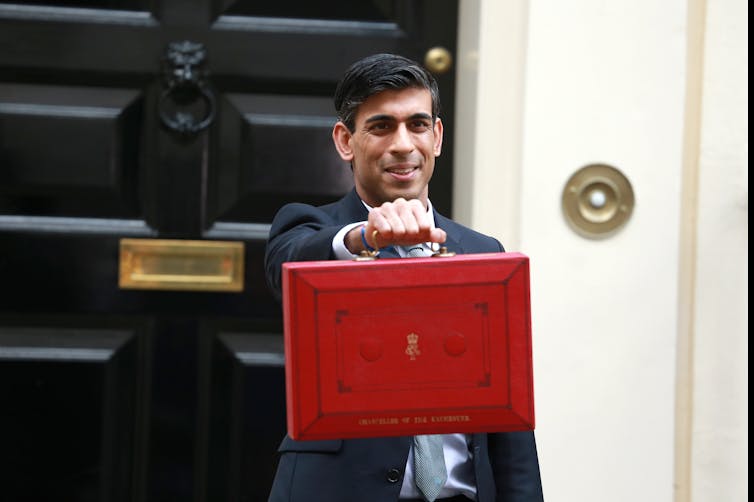Peter Urwin, University of Westminster
A doubling of unemployment in the UK. That’s what we were facing, according to the Bank of England, which predicted a rise to 7.75% by 2021, the highest since 2013. That was, until news broke of possible vaccines with efficacy of more than 90%.

It has been difficult to follow the details of frequently changing employment policy in the UK since March, with more to come in the spending review. To get to the heart of this policy debate it is important to understand the “tricky balancing act” that the chancellor of the exchequer, Rishi Sunak, has alluded to since the start of the pandemic. The competing aims that need to be balanced, of protecting jobs but not dampening incentives for job creation, were most obvious at the end of September when the chancellor announced details of the Job Support Scheme (JSS) – replacing the Coronavirus Job Retention Scheme (CJRS) or “furlough”, as most people call it.
The CJRS paid 80% of the wages of workers placed on furlough up to a maximum of £2,500 a month and had a straightforward rationale – the UK government closed down entire sectors of the economy, and without support there would have been a more immediate and painful rise in unemployment. This policy aimed to protect jobs as the UK went into lockdown in March. In years to come the decision to close the economy will be picked over by commentators but, with the notable exception of Sweden, the UK has mirrored the approach of governments around the world and received praise from the IMF for its package of measures.

With hindsight, changes announced at the end of September to replace the CJRS with the JSS seem premature. We should perhaps have been more aware of the potential for a reopening of schools, colleges and universities to drag infection rates back up, but at that point rates were low and the economic recovery seen over the summer was taken as an indication that support for jobs could start to be reduced. Furlough was the right policy at a time when all jobs needed to be protected, but on the other side of a crisis there is a need to focus protection on the jobs that companies consider “viable” and boost the creation of new employment opportunities.
This is the tricky balancing act. The furlough scheme is the most expensive part of the government’s package of COVID-19 measures, making up around £35bn of the approximate £210bn cost over the first six months of the crisis. The way government calculates the value of interventions, weighing up these costs relative to the likely benefits, it is likely to more than pay its way. But this is only true for periods of severe lockdown and in July around five million workers were still receiving support from the scheme. At the end of September the other side of this tricky balancing act started to come into view, as this blanket support reduces the incentives for new job creation by entrepreneurs and a different scheme was needed.
The Job Support Scheme started to taper off support, avoiding a cliff-edge, but forcing companies to make decisions over which jobs they felt would be “viable” going forwards – to say that this is a hard call is a huge understatement and talk of people’s livelihoods in such terms seems harsh. Unemployment provides a similar hit to wellbeing as the death of a loved one, divorce and other life-changing events.
But it’s also very important to understand the realities of labour markets. In a typical year the overall level of employment in the economy, the “net” position, is a result of around 2.5 million new jobs and in a good year closer to 2 million job losses. The furlough scheme puts a brake on this process of creation and destruction, and the JSS was designed to fire it back up again. The labour market is a constant process of job creation and destruction – a well functioning labour market requires both.
Clearly September was a false dawn, and we are now likely back to forms of lockdown for the rest of the winter. However, we might suggest that the chancellor is one of Napoleon’s “lucky generals”, sorely needed by Boris Johnson. His announcement on November 5 that the furlough scheme was to be extended until the end of March 2021 looks prescient, given subsequent announcements of a Pfizer vaccine that is more than 90% effective – quickly followed by good news on the Moderna vaccine. These vaccines may be ready for distribution by the end of 2020
How does a vaccine change things? Put yourself in the place of those employers making the call on “viable” jobs. Before vaccine announcements there was no information on which to base their estimate of the time they would need to survive before the return of any kind of normal, and they couldn’t be sure if normal-ish was even a realistic hope. The chancellor’s forthcoming spending review announcements on November 25 were planned to be for three years, but changed to one year because of this uncertainty – business plans were similarly hard to write before the vaccine announcements.
With the prospect of a vaccine, the previous projections, calculations and activities of companies can now credibly be used to forecast the future and give some idea of viability. The certainty that vaccines will bring, together with the chancellor’s support to the end of March, now mean we have a real chance of avoiding a doubling of unemployment in 2021.
Peter Urwin, Director, Centre for Employment Research, University of Westminster
This article is republished from The Conversation under a Creative Commons license. Read the original article.












